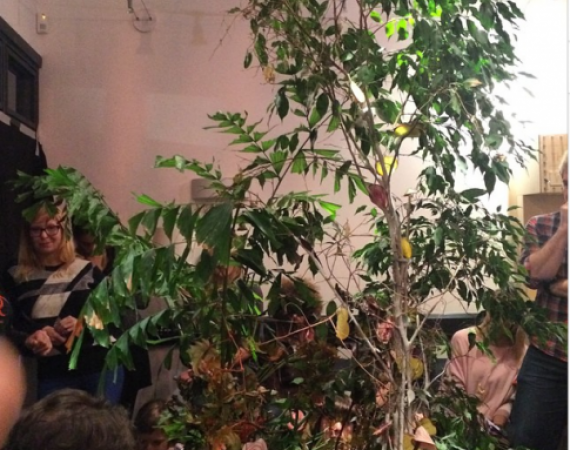Posted on Mon 13 Oct 2014
Sustaining Creativity
The Studio has been brimming with intense discussion this week, due to the Sustaining Creativity Environmental Data Lab we hosted in partnership with Julie’s Bicycle. As part of the lab, a group of artists and technologists (some Studio residents, some exciting new faces) got together to explore…

Sustaining Creativity Lab participants preparing to showcase one of their prototypes... Photo @clarered
The Studio has been brimming with intense discussion this week, due to the Sustaining Creativity Environmental Data Lab we hosted in partnership with Julie’s Bicycle. As part of the lab, a group of artists and technologists (some Studio residents, some exciting new faces) got together to explore what to do with environmental data. The cohort was split into 3 groups, exploring either indoor spaces, urban outdoor spaces or rural outdoor spaces.
- The indoor group pondered ways of encouraging reflection on room temperature. They had the idea to measure the temperature of a room, and match it to an outdoor location somewhere on the planet. The rooms inhabitants would be able to stick their heads through a hole in the wall, and see a live stream of a street in Mumbai, Copenhagen or Glasgow.
- The urban outdoor group were interested in people’s journeys to work and how to use that time and space to make them more aware of their environment. They considered creating a bike helmet that could monitor stress levels, and a bike that could draw a chalk line on the road. The line would change colour in more stressful areas, this could highlight the city’s danger spots for commuters and city planners. They also discussed creating an app to track the way in which people travel, and installing ‘journey pods’ along busy roads. Entering the journey pod would give people a quiet moment of reflection, where the data collected from their phone, relating to their journey, the time and the environment, would be gathered into short poems for them to listen to.
- The rural outdoor group looked into the visibility of air pollution. They found that some plants fluoresce in UV light, including silver birches. By planting trees in spare land, they would be helping to solve air pollution issues. When air pollution reaches a dangerous level, blacklights hidden in the ground could turn on, causing the trees to glow as a warning. Using capacitors, they would use energy from the tree itself to power the lights.
It was brilliant to have so much discussion and debate in the Studio at the time of the lab, and conversations have continued to unfold around how we can successfully merge the creative industries with sustainability.
We have some exciting new faces in the Studio this week. Tom Marshman has just started his Artist Residency. He will be spending a couple of weeks with us at the Studio developing Move Over Darling, a Lesbian, Gay, Bisexual and Transgendered (LGBT) history project. Since 2010, Tom has worked with local communities to collect older LGBT people’s stories, from which he has created a moving performance walk. He’s here to have conversations with residents about how he could use emerging technology in his work.
Richard Sandford joined the Studio this week, he is an education researcher with an interest in technology, particularly in relation to space and games. He’s currently doing a PhD at the Graduate School of Education on the way the future is represented in education, and what that means for the choices offered to learners.
Mark Oakley has joined the Daredevil Project team to help get the word out about their brilliant new peer-to-peer challenge game, #Duel, which will be launched into the world soon (keep your eyes peeled for opportunities to playtest.)